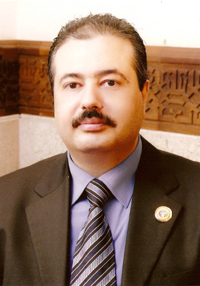Hamdan Medical Award participates in the 1st International Conference on Consanguinity in Muscat
23 March 2012
Hamdan Medical Award participated in the 1st International Conference on Consanguineous Marriage, Muscat, from 17th till 19th of March at Al Bustan Palace, under the title of "towards discovering disease-causing genes or that protect against diseases".
The conference was organized by College of Medicine and Health Sciences, Sultan Qaboos University, in collaboration with Bologna Medical School in Italy, under the auspices of Dr. Saud Bin Ali Al Bimani, Vice-Chancellor of Sultan Qaboos University, with participation of a number of local and international experts in genetics, medicine and epidemiology from the USA, Australia, Europe and the Middle East.
Dr. Ghazi Tadmouri, Assistant Director of the Award’s Centre for Arab Genomics Studies (CAGS) said that the conference has aimed at studying Consanguineous Marriage and its impacts on the Public Health.
"During the conference, CAGS presented a research paper on Consanguineous Marriage in Arabs. Although, Consanguinity could have an effect on some reproductive health parameters such as postnatal mortality and rates of congenital malformations, it offers a unique advantage that could lead to the identification and characterization of many genes responsible for human disease and provide a new genotype-phenotype map of the human genome", Dr. Tadmouri said.
"Many Arab countries display some of the highest rates of consanguineous marriages in the world, and specifically first cousin marriages which may reach 25-30% of all marriages. While in some Arab States frequencies of consanguineous marriages are decreasing (e.g., Bahrain, Jordan, Lebanon, Palestine), in other countries consanguinity rates are increasing in the current generation (e.g., Qatar, UAE, and Yemen)", he added.

